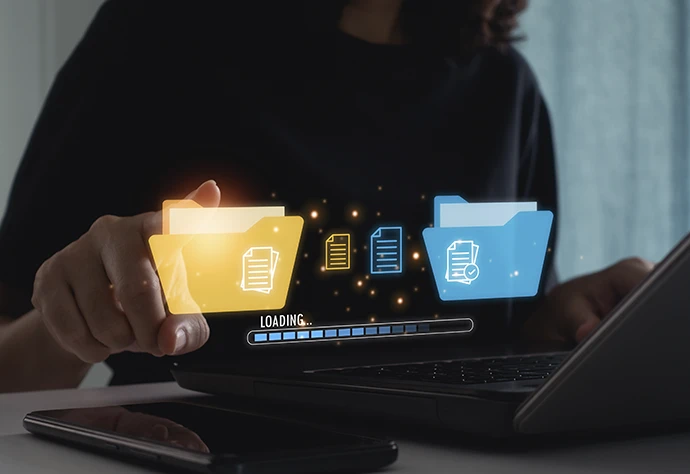
Specialized support line for Corporate Customers.
- Corporate
- Treasury
- Payments receivables
- SEPA C2B Charges File
SEPA - Submission of C2B Charges File
One file, multiple collections


Alignment of beneficiary account identifiers: the IBAN (International Bank Account Number) and BIC (Bank Identifier Code) will be used for both cross-border and national transactions.
Alignment of beneficiary account identifiers: the IBAN (International Bank Account Number) and BIC (Bank Identifier Code) will be used for both cross-border and national transactions.
How does it work
It's that simple



Features
What you should know







SEPA Direct Debits consist of two distinct services: the CORE service and the Business to Business (B2B) service.
CORE Direct Debits
Service available to creditors who wish to collect payments from Debtor Customers who are either individuals or companies.
Business to Business (B2B) Direct Debits
Service available to creditors who wish to collect payments only from corporate customers.
Although there are no layout differences, the business model is different.
In the B2B service, the debtor cannot obtain a refund of funds from their Bank, meaning there is no reimbursement option, which helps reduce collection risks.
In B2B, the collection timelines and information return deadlines are shorter than those applicable to CORE Direct Debits.
In B2B, the debtor’s Bank is required to validate the existence of the Direct Debit Mandate (ADC – authorization for direct debit) whenever a new collection instruction is issued.
B2B is not available to consumers; it is an exclusive model for Companies.
It is also important to note that a direct debit mandate for CORE Direct Debits is not valid for B2B Direct Debits, meaning a specific mandate is required for this type of arrangement.
SEPA Direct Debits consist of two distinct services: the CORE service and the Business to Business (B2B) service.
CORE Direct Debits
Service available to creditors who wish to collect payments from Debtor Customers who are either individuals or companies.
Business to Business (B2B) Direct Debits
Service available to creditors who wish to collect payments only from corporate customers.
Although there are no layout differences, the business model is different.
In the B2B service, the debtor cannot obtain a refund of funds from their Bank, meaning there is no reimbursement option, which helps reduce collection risks.
In B2B, the collection timelines and information return deadlines are shorter than those applicable to CORE Direct Debits.
In B2B, the debtor’s Bank is required to validate the existence of the Direct Debit Mandate (ADC – authorization for direct debit) whenever a new collection instruction is issued.
B2B is not available to consumers; it is an exclusive model for Companies.
It is also important to note that a direct debit mandate for CORE Direct Debits is not valid for B2B Direct Debits, meaning a specific mandate is required for this type of arrangement.
First (FIRST)
This classification is used after sending the first collection for the SEPA Direct Debit Mandate. If the collection is successful, subsequent collections will have a different classification. In the case of a rejected collection, the next submission must again be classified as FIRST.
Recurrent (RCUR)
Used from the second collection onward, provided the first collection was successful.
Final (FINAL)
Indicates that the creditor does not intend to make further collections under the mandate. The mandate is automatically canceled after this collection.
One-Off (ONE OFF)
Allows the creditor to make a single collection. After the collection, the SEPA Direct Debit Mandate is automatically canceled.
First (FIRST)
This classification is used after sending the first collection for the SEPA Direct Debit Mandate. If the collection is successful, subsequent collections will have a different classification. In the case of a rejected collection, the next submission must again be classified as FIRST.
Recurrent (RCUR)
Used from the second collection onward, provided the first collection was successful.
Final (FINAL)
Indicates that the creditor does not intend to make further collections under the mandate. The mandate is automatically canceled after this collection.
One-Off (ONE OFF)
Allows the creditor to make a single collection. After the collection, the SEPA Direct Debit Mandate is automatically canceled.
In addition to debit instructions, the processing cycle includes a set of exception transactions (R-Transactions) provided for in the services/schemes. These transactions may occur either before or after interbank settlement.
Pre-settlement transactions result in the cancellation of the original debit instruction
Post-settlement transactions may occur within a predetermined number of days (counting from the settlement date) and result in a second interbank settlement process.
Pre-settlement transactions
- Rejects: Collections that are not executed due to technical reasons, even before interbank settlement (e.g. "invalid account format") or because the debtor’s Bank does not accept the transaction.
- Refusals: Rejections initiated by the debtor, when they become aware of the receipt of a new SEPA Direct Debit Mandate or Direct Debit Instruction.
Post-settlement transactions
- Reversals: Transactions occurring after the settlement date, up to 5 subsequent TARGET business days, where the creditor concludes that the collection was wrongly submitted. The debtor is credited at the creditor’s initiative.
- Returns (by the debtor’s Bank): Collections that are not executed due to operational reasons, always occurring after interbank settlement. Returns are initiated by the debtor’s Bank and must be presented within a maximum of 5 TARGET days after the interbank settlement date under the Core scheme, and within 2 TARGET days under the B2B scheme.
- Refunds: Requests by the debtor for reimbursement of funds from a collection after settlement, always within 8 weeks following the debit date (operationally corresponding to 47 TARGET days after interbank settlement). If the reason for the refund is the absence of a valid mandate, and it is requested up to 13 months after the debit date (operationally corresponding to 440 calendar days), it is referred to as a refund due to absence of a valid mandate.
In addition to debit instructions, the processing cycle includes a set of exception transactions (R-Transactions) provided for in the services/schemes. These transactions may occur either before or after interbank settlement.
Pre-settlement transactions result in the cancellation of the original debit instruction
Post-settlement transactions may occur within a predetermined number of days (counting from the settlement date) and result in a second interbank settlement process.
Pre-settlement transactions
- Rejects: Collections that are not executed due to technical reasons, even before interbank settlement (e.g. "invalid account format") or because the debtor’s Bank does not accept the transaction.
- Refusals: Rejections initiated by the debtor, when they become aware of the receipt of a new SEPA Direct Debit Mandate or Direct Debit Instruction.
Post-settlement transactions
- Reversals: Transactions occurring after the settlement date, up to 5 subsequent TARGET business days, where the creditor concludes that the collection was wrongly submitted. The debtor is credited at the creditor’s initiative.
- Returns (by the debtor’s Bank): Collections that are not executed due to operational reasons, always occurring after interbank settlement. Returns are initiated by the debtor’s Bank and must be presented within a maximum of 5 TARGET days after the interbank settlement date under the Core scheme, and within 2 TARGET days under the B2B scheme.
- Refunds: Requests by the debtor for reimbursement of funds from a collection after settlement, always within 8 weeks following the debit date (operationally corresponding to 47 TARGET days after interbank settlement). If the reason for the refund is the absence of a valid mandate, and it is requested up to 13 months after the debit date (operationally corresponding to 440 calendar days), it is referred to as a refund due to absence of a valid mandate.
You should take into account the following minimum and maximum lead times for submitting collection files.
Minimum lead time
| Date/time of transaction |
All types of collection (CORE or B2B) and all classifications (FRST, RCUR, OOFF, FNAL) |
|---|---|
| Earliest possible collection date | |
| Until 10 am and the day is a TARGET business day¹ (D) | D+1 |
| After 10 am and the day is a TARGET business day¹ (D) | D+2 |
¹Non-business days target are the following:
- Saturdays
- Sundays
- January 1st
- Good Friday
- Easter Monday
- May 1st
- December 25th
- December 26th
Maximum advance booking: up to 14 calendar days.
You should take into account the following minimum and maximum lead times for submitting collection files.
Minimum lead time
| Date/time of transaction |
All types of collection (CORE or B2B) and all classifications (FRST, RCUR, OOFF, FNAL) |
|---|---|
| Earliest possible collection date | |
| Until 10 am and the day is a TARGET business day¹ (D) | D+1 |
| After 10 am and the day is a TARGET business day¹ (D) | D+2 |
¹Non-business days target are the following:
- Saturdays
- Sundays
- January 1st
- Good Friday
- Easter Monday
- May 1st
- December 25th
- December 26th
Maximum advance booking: up to 14 calendar days.
Step by step
It's easy making payments




Step by step
It's easy making payments




Frequently asked questions
Questions? We’ll help
Collections are only available within the SEPA area. Since Portugal is part of the SEPA area, you can collect from both domestic and cross-border customers in a single file.
Collections are only available within the SEPA area. Since Portugal is part of the SEPA area, you can collect from both domestic and cross-border customers in a single file.
The migration process from the current Direct Debit System to SEPA CORE Direct Debits requires several technical changes, which makes it necessary to adapt existing contracts to the new framework. For more information, please contact your usual Millennium representative.
The migration process from the current Direct Debit System to SEPA CORE Direct Debits requires several technical changes, which makes it necessary to adapt existing contracts to the new framework. For more information, please contact your usual Millennium representative.
Transfers can only be made in euros.
Transfers can only be made in euros.
Frequently asked questions
Questions? We’ll help
Collections are only available within the SEPA area. Since Portugal is part of the SEPA area, you can collect from both domestic and cross-border customers in a single file.
Collections are only available within the SEPA area. Since Portugal is part of the SEPA area, you can collect from both domestic and cross-border customers in a single file.
The migration process from the current Direct Debit System to SEPA CORE Direct Debits requires several technical changes, which makes it necessary to adapt existing contracts to the new framework. For more information, please contact your usual Millennium representative.
The migration process from the current Direct Debit System to SEPA CORE Direct Debits requires several technical changes, which makes it necessary to adapt existing contracts to the new framework. For more information, please contact your usual Millennium representative.
Transfers can only be made in euros.
Transfers can only be made in euros.
Related topics
You might like these too...








Need help?
We are here for you
 Looking for a branch?
Looking for a branch?
 Need to call us?
Need to call us?





